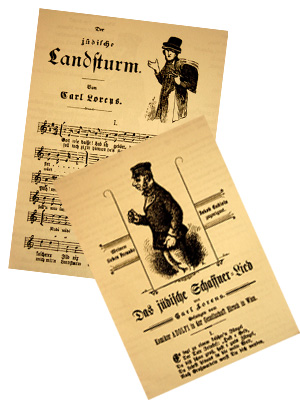 |
|
|||||||||
|
These Jewish cabaret-music broadsides, sold for pittance on Vienna streets at the turn of the last century, were recovered from the city’s library archive by Philip Bohlman, professor in the Department of Music and the College. The broadside without musical notation translates to “The Jewish Conductor’s Song,” while the sheet with musical notes reads “The Jewish Country Regiment.” The images on both, Bohlman says, were generic and probably served 50 songs. A government censor approved and made copies of such broadsides before they could be sold. Many copies survived World War II. “A lot of sources were destroyed in the Holocaust,” says Bohlman, who studies both formal and vernacular modern European Jewish music, “so I’m constantly on the lookout for this type of material.” Bohlman and Otto Holzapfel of the German Folk Song Archive published the broadsides, along with others, in The Folk Songs of Ashkenaz (A–R Editions, 2001). Bohlman’s eight-member cabaret ensemble, the New Budapest Orpheum Society, also performs the music. The group, whose musical director is Music Department lecturer Ilya Levinson, PhD’97, performs a dozen times a year, including at last May’s U.S. Holocaust Museum show, and last year released a CD, Dancing on the Edge of a Volcano: Jewish Cabaret Popular and Political Songs, 1900–1945. As artistic director, Bohlman says, “I weave historical commentary and jokes” into the show. “I might act out or sing.”—A.M.B.
|
|
Contact
|


